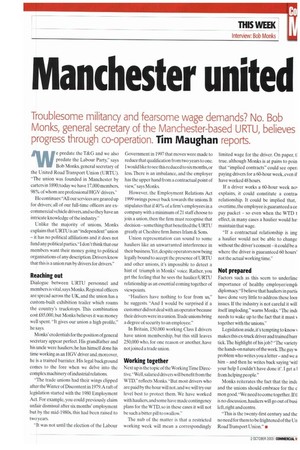Manchester nited
Page 27

If you've noticed an error in this article please click here to report it so we can fix it.
Troublesome militancy and fearsome wage demands? No. Bob Monks, general secretary of the Manchester-based URTU, believes progress through co-operation. Tim Maughan reports.
11We predate the T&G and we also predate the Labour Party," says Bob Monks, general secretary of the United Road Transport Union (URTU). "The union was founded in Manchester by carters in 1890:today we have 17,000 members, 98% of whom are professional HGV drivers," He continues: "All our services are geared up for drivers; all of our full-time officers are excommercial vehicle drivers, arid so they have an intricate knowledge of the industry."
Unlike the majority of unions. Monks explains that URTU is an "independent" union it has no political affiliations and it does not fund any political parties."I don't think that our members want their money going to political organisations of any description. Drivers know that this is a union run by drivers for drivers."
Reaching out
Dialogue between URTU personnel and members is vital,says Monks. Regional officers are spread across the UK, and the union has a custom-built exhibition trailer which roams the country's truckstops. This combination cost £85.000, but Monks believes it was money well spent:'It gives our union a high profile," he says.
Monks' credentials for the position of general secretary appear perfect. His grandfather and his uncle were hauliers; he has himself done his time working as an HGV driver and, moreover, he is a trained barrister. His legal background comes to the fore when we delve into the complex machinery of industrial relations.
"The trade unions had their wings clipped after the Winter of Discontent in 1979.A raft of legislation started with the 1980 Employment Act. For example, you could previously claim unfair dismissal after six months' employment but by the mid-1980s, this had been raised to two years.
"It was not until the election of the Labour Government in 1997 that moves were made to reduce that qualification from two years to one. I would like to see this reduced to six months, or less. There is an imbalance, and the employer has the upper hand from a contractual point of view," says Monks.
However. the Employment Relations Act 1999 swings power back towards the unions. It stipulates that if 40% of a firm's employees in a company with a minimum of 21 staff choose to join a union. then the firm must recognise that decisionsomething that benefited the URTU greatly at Cheshire firm James Irlam & Sons.
Union representation can sound to some hauliers like an unwarranted interference in their business.Yet, despite operators now being legally bound to accept the presence of URTU and other unions, it's impossible to detect a hint of triumph in Monks' voice. Rather, you get the feeling that he sees the haulier/URTU relationship as an essential coining together of viewpoints.
"Hauliers have nothing to fear from us." he suggests. "And I would be surprised if a customer did not deal with an operator because their drivers were in a union.Trade unions bring a degree of security to an employee."
In Britain, 150,000 working Class I drivers have union membership, but this still leaves 250,000 who, for one reason or another, have not joined a trade union.
Working together
Next up is the topic of the WorkingTtme Directive."Well,salaried drivers will benefit from the WTD," reflects Monks. "But most drivers who are paid by the hour will not.and we will try our level best to protect them. We have worked with hauliers, and some have made contingency plans for the WTD, so in these cases it will not be such a bitter pill to swallow."
The nub of the matter is that a restricted working week will mean a correspondingly limited wage for the driver. On paper. t] true. although Monks is at pains to poin that "implied contracts" could see open paying drivers for a 60-hour week, even if have worked 48 hours.
If a driver works a 60-hour week no explains, it could constitute a contra relationship. It could be implied that, overtime, the employee is guaranteed ace pay packet so even when the WTD t effect, in many cases a haulier would ha, maintain that wage.
"If a contractual relationship is inir a haulier would not be able to change without the driver's consent -it could be a where the driver is guaranteed 60 hours' not the actual working time."
Not prepared Factors such as this seem to underline importance of healthy employer/emph diplomacy.-I believe that hauliers in partic have done very little to address these loor issues. If the industry is not careful it will itself imploding," warns Monks. "The indt needs to wake up to the fact that it must s together with the unions."
Legislation aside, it's tempting to know makes this ex-truck driver and trained barr tick. The highlight of his job? "The variety the hands-on nature of the work.The guy w problem who writes you a letter and we a him and then he writes back saying 'witl your help I couldn't have done it'. I get a I from helping people."
Monks reiterates the fact that the indt and the unions should embrace for the c mon good. "We need to come together. If ti is no discussion. hauliers will go out of busi left,right and centre.
"This is the twenty-first century and the no need for them to be frightened of the Us Road Transport Union."




























































































































































































